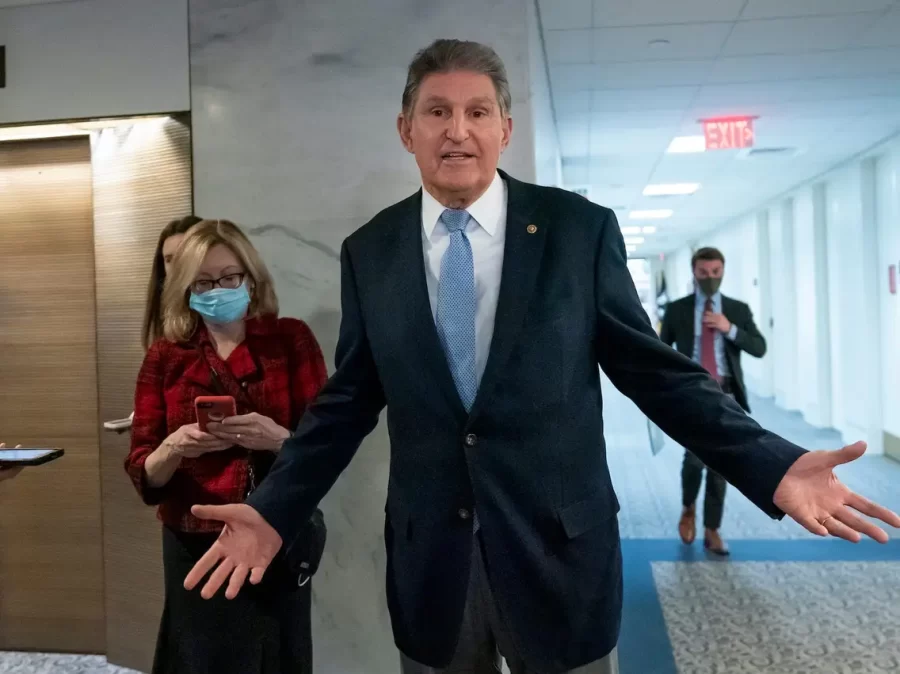Manchin’s coal investments display corruption
Senator Joe Manchin’s questionable ties to the coal industry may contextualise his political decisions
Joe Manchin walks through a Senate office building.
April 14, 2022
For years, the name “Joe Manchin” has never fully settled amongst Democrats and Republicans alike. Instead, it has lingered in the air as decisions regarding voting rights, social policy and infrastructure dominate the Senate floor. Uncertainty surrounding the direction of Manchin’s support has stalled policy. In recent months, however, Manchin has become associated with a new and even more controversial aspect of his role as a public servant: his involvement in the dying coal industry.
As a moderate Democrat hailing from West Virginia, Manchin has opposed the majority of climate legislation put forth by members of his party. Thus, Manchin’s decision to block President Joe Biden’s ambitious spending bill — which proposes to combat the climate crisis through greenhouse gas emissions reductions — was unsurprising. The revelatory facet of Manchin’s stance, though, can be found in his personal ties to the coal industry within his home state.
West Virginia’s economy is intrinsically intertwined with coal. Bituminous coal, a variety of this fossil fuel, is a primary export of the state and makes up 12% of the United States’ coal that is generated by West Virginia. Furthermore, West Virginia stands as the largest bituminous coal-producing state in the country and the second-largest coal-producing state.
Fossil fuel corporations consistently dominate the economic sphere in neighboring Appalachian states as well. Yet this enterprise possesses vast environmental consequences for West Virginia and the nation as a whole, not only in its combustion and subsequent emissions, but also in its excavation and refining.
During the process of coal mining, waste rock is removed and typically discarded. Throughout the mining of bituminous coal, these scraps can be collected and gathered to form garbage of bituminous (gob). By itself, gob does not harbor a plethora of profitable qualities, but when it is combined with low-quality coal as a cheap source of volume, it provides a combustible source of energy.
Decades ago, during Manchin’s rise to power as a West Virginia senator, he entered into the coal business with the Grant Town power plant. This action resulted in revenue directly servicing Manchin’s individual finances, as he became the sole provider of gob for Grant Town. Even more questionably, Manchin was promised a percentage of Grant Town’s profits from selling this energy back to the very constituents who elected him. Over the course of this endeavor, Manchin’s wealth grew by the millions. Conversely, West Virginia remained the second-poorest state in the nation, with 16% of residents living below the poverty line in 2019.
Manchin’s expansive series of connections to the coal industry create a significant conflict of interest in the debate centered around climate policy. Despite this, Manchin has vehemently defended his position in relation to the Grant Power plant, stating that he was not in violation of Congressional ethics.
This oversight in U.S. policy demonstrates a clear necessity for stricter regulations directed toward public officials. Regardless of Manchin’s lack of moral qualms with leveraging his power to protect a corporation that his own business is partnered with, his ability to continue this relationship unobstructed by law underscores the flaws within our legislative system today.
Moreover, this controversy highlights the drastic and pertinent demand for advancements in the realm of environmental justice and policy. The environmental hazards associated with the harvesting of gob — namely groundwater contamination and air pollution — disproportionately plague disadvantaged residents in the low-income communities that these coal plants establish themselves in. Although the fossil fuel industry has shown time and time again that profits precede environmental and public health concerns, the senator representing West Virginians should prioritize their wellbeing and side with those who elected him to public office, not the company enlarging his pockets.
The time has come for Manchin to prioritize his role as a public servant over his net worth. While it is evident that he does not share this sentiment, his autonomy to determine his involvement with Grant Power and gob must end, for the integrity of both U.S. democracy and the planet.
















Anne Cressman • Apr 28, 2022 at 8:25 pm
I think he is absolutely terrible. a lie by omission is still a lie
by keeping his personal interest in coal the power plant how much money he receives from both silent to his constituents should make this a crome